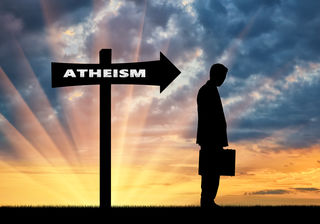Ethics and Morality
Profoundly Challenging Questions to Ask an Atheist
Theism must explain the problem of evil; atheism must explain everything else.
Posted January 12, 2019 Reviewed by Jessica Schrader
“People have always wanted answers to the big questions. Where did we come from? How did the universe begin? What is the meaning and design behind it all? Is there anyone out there? The creation accounts of the past now seem less relevant and credible... .
We are each free to believe what we want, and it’s my view that the simplest explanation is that there is no God. No one created the universe and no one directs our fate.”
—Stephen Hawking, Brief Answers to the Big Questions1

I once heard a theologian in a science-religion debate astutely declare that whereas religious believers must explain the ‘problem of evil,’ nonbelievers must explain everything else.
The religiously unsolvable 'problem of evil' (why do terrible things happen in a world governed by an all-powerful, all-knowing, all-good god?) certainly does challenge the notion of a personal God who cares about each of us individually. And the idea of such a God authoring books has also lost ground, with many liberal branches of Judeo-Christian religions having moved beyond literal belief in divine revelation of the Bible—since it is now well established that the books of the Hebrew Bible were written in stages by very human writers many centuries later than the Bible’s own claimed authorship.
But this still leaves much room for belief in some sort of supernatural higher power or god, some kind of intentional, conscious force of nature that created, designed, and continues to guide the universe and its contents.
Compelling arguments for belief in a higher power
Until quite recent times, some of the fundamental mysteries about the universe stumped many thoughtful, educated people—even many top scientists—and seemed to support supernatural beliefs, defying rational explanations.
The theistic view seemed intellectually credible, even appropriately skeptical. Darwin himself articulated the central dilemma underlying these sorts of questions when he wrote of the extreme difficulty conceiving of the universe as the result of blind chance:
"Another source of conviction in the existence of God, connected with the reason and not with the feelings, impresses me as having much more weight. This follows from extreme difficulty or rather impossibility of conceiving this immense and wonderful universe, including man with his capacity of looking far backward and far into futurity, as the result of blind chance or necessity. When thus reflecting I feel compelled to look to a First Cause having an intelligent mind in some degree analogous to that of man; and I deserve to be called a Theist."2
Theism even made a comeback in recent decades, as science revealed the incredible intricacy and complexity of life and the universe. It all seemed too complex, too ‘clever’ to be unguided. Several enigmas remained seemingly impenetrable.
A sophisticated intellectual defense of belief in God usually starts with some version of the argument that the universe must have had a beginning and could not have brought itself into existence: Why is there something rather than nothing? How could something come from nothing? The argument then proceeds to the assertion that the immense complexity of our world could not have arisen spontaneously and unguided.
The greatest complexity known to us in the universe is the biological complexity of living creatures. Even those theologians who accept the scientific evidence for evolution as a complete explanation for biological complexity typically argue that God operates by means of evolution. However, a more than superficial understanding of evolution does lead many believers to the troubling and inescapable conclusion that a God who uses evolution to create living creatures can only be thoroughly cruel or indifferent, not to mention inefficient, tinkering, and bungling. On this point, the evolution-rejecting literal creationists are probably correct: the teaching of evolution is deeply corrosive to religious faith.
Nevertheless, believers in a higher power and higher plan who do accept evolution as entirely unguided can still fall back on the argument that the laws of physics are improbably fine-tuned to have allowed organized matter and life to have arisen in the first place. Towards the end of the twentieth century, this argument seemed insurmountable. Believers could also point out that one of the most important laws of physics, the second law of thermodynamics, dictates that the universe proceeds toward increasing levels of disorder (entropy). So how could order arise unguided, spontaneously reversing this inexorable natural tendency toward disorder?
Adding to the impression of a spiritual realm and supernatural design, the mystery of consciousness is especially compelling: How could matter become conscious and self-aware, and how could this happen spontaneously and unguided? How can the experience of ‘I’ be reducible to the laws of physics and to mere matter? How is it possible that our conscious selves could have formed as temporary phenomena and then just evaporate into utter nonexistence when we die?
Moreover, what about values and ethics? How could such abstract and intangible qualities arise from the material ’stuff’ of the universe? Even if they somehow could, wouldn’t morality be arbitrary or relative? How can meaning arise in a random, material universe? How does purpose itself emerge in a purposeless universe?
These are all intelligent and compelling arguments. They are a big part of the reason why, despite the decline of religion in Western societies over the last few centuries (a process that has accelerated in the last few decades and especially in recent years), many people still believe in some sort of higher power and higher plan.
A seismic shift in our understanding of the world
Nonetheless, in this century, there has been a dramatic shift toward definitive, convinced atheism among large numbers of former agnostics and believers, including a great many notable public intellectuals. And the majority of scientists, especially top-level scientists, are nonbelievers. Indeed, science today is practically synonymous with atheism. How come?
Despite many seemingly convincing arguments in favor of a supernaturally designed universe, a powerful scientific worldview has been constructed in modern times, with several key parts of the overall picture snapping into place in the last decade or two.
We now have highly compelling and entirely plausible models for how our world, life, and consciousness could in fact have emerged entirely spontaneously and unguided—indeed all the way from the universe’s origin to its present complexity. Applying these models, no external or first cause is required, no intelligent designer, and no guiding hand. Science can also explain the fully natural emergence of purpose, meaning, and morality in a universe that began as simple, random, lifeless, purposeless, and indifferent.
Science has been making astounding inroads into the big questions. Scientific insights have been acquired at such a rapid rate that most people have not kept pace with them, do not understand them, and have not grasped their full implications.
Many popular science writers, myself included, have tried to synthesize and explain these insights in simple, understandable terms accessible to the average educated reader, in an attempt to bring the public up to speed (through this blog series, and more fully in reference 3 below). As a psychiatrist, my own particular interest is in sharing insights that I think can help relate the science to the humanistic level of our individual lives—to the things that really matter to people in their search for purpose and meaning, living their lives in the face of uncertainty, anxiety and adversity.
Nobody is suggesting that science has complete explanations for everything. Some of the explanations have well-established evidence; others are at the stage of plausible hypotheses and will continuously be improved. But science provides far better explanations and models for the appearance of design in the universe than does the invocation of supernaturalism—better in the sense that the scientific explanations fit the data much more tightly, without the contradictions and arbitrary adjustments that are required to make religious, supernatural models of the world fit reality. Importantly, the supernatural-free scientific models also make much more accurate, verifiable predictions.
Today’s scientific worldview is the result of pivotal breakthroughs in disparate fields. Considered separately and individually, these insights are radically paradigm-shifting in each of their fields. Taken together, they may actually be leading to a tipping point in the intellectual history of humankind.
In considering your own worldview, formulate the most profoundly challenging questions that can be posed to an atheist. Then seek the most informed answers. The answers might surprise you and set you on a fascinating path of discovery.
We're well into the 21st century now. Don't get left behind.
References
1. Hawking, Stephen. Brief Answers to the Big Questions. New York: Bantam Books, 2018, pp. 3, 38
2. Charles Robert Darwin, The Autobiography of Charles Darwin (London: Collins, 1958), http://darwin-online.org.uk/content/frameset?pageseq=94&itemID=F1497&viewtype=image.
3. Lewis, Ralph. Finding Purpose in a Godless World: Why We Care Even If The Universe Doesn’t. Amherst, NY: Prometheus Books, 2018. Parts of this blog post were adapted from the book, which is a deeper dive into questions of purpose, meaning and morality in a random, purposeless, godless universe.
See this YouTube video link for an engaging Power Point presentation in which Dr. Lewis explains how a family health crisis focused him on coming to terms with the outsized role of randomness in life, and to wrestle with the question of whether the scientific worldview of a fundamentally random universe is nihilistic. He summarizes how science has come to view the universe and absolutely everything in it as the product of entirely spontaneous, unguided processes, and why this is actually a highly motivating realization for humankind. Or see this link for a very brief video providing a synopsis of the book.




